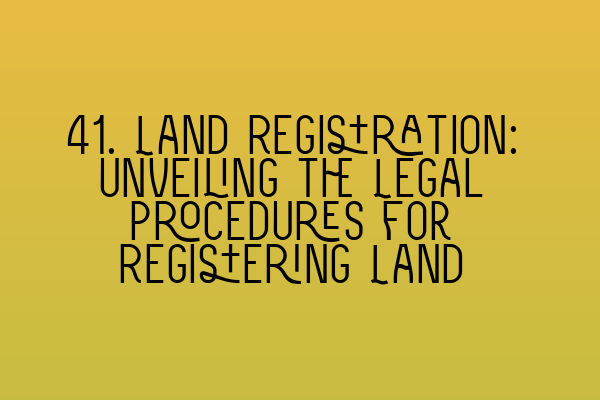41. Land Registration: Unveiling the Legal Procedures for Registering Land
Welcome to SQE Property Law & Land Law! As leading solicitors in the field, we are here to guide you through the intricate world of land registration. Whether you are a property owner, buyer, or simply curious about the legal procedures involved, this blog post will shed light on the process and its significance.
Land registration is the official recording of ownership rights and interests in land. It provides certainty, clarity, and protection to landowners and helps facilitate property transactions. In the United Kingdom, the Land Registration Act 2002 governs this process, ensuring a transparent and efficient system.
So, let’s dig deeper and understand the legal procedures involved in registering land:
1. Initiation of the Registration Process:
The registration process typically begins when a person wants to register their land for the first time or when there is a change in ownership. To initiate the process, an application for registration must be made to the Land Registry. This application should contain accurate information about the land, including its boundaries, ownership, and any rights or restrictions affecting it.
2. Examination of the Application:
Once the application is submitted, the Land Registry examines it thoroughly. They verify the information provided and conduct necessary searches to ensure there are no conflicting interests or claims on the land. This step is crucial to maintain the integrity of the land registration system.
3. Registration and Creation of Title:
After the application passes the examination stage, the Land Registry creates a title for the registered land. This title acts as an official record of ownership and sets out the legal rights and restrictions associated with the land. It is important to note that land may be registered with either an absolute or possessory title, depending on the circumstances.
4. Protection of Registered Land:
Registered land benefits from various forms of protection. For instance, a registered owner is protected by a state-backed guarantee of title, which means that the Land Registry will compensate them if they suffer loss due to a mistake made by the Registry. Additionally, registration creates an overriding interest, making it binding on all future purchasers of the land.
5. Dealing with Third-Party Interests and Notices:
During the registration process, it is crucial to address any third-party interests or notices that may affect the land. These interests can include mortgages, leases, or rights of way. Parties with such interests must apply to the Land Registry to protect their rights. Failure to do so may result in their interests not being recognized.
6. Transfer of Registered Land:
The transfer of registered land involves a change in ownership. This can occur through a sale, gift, or inheritance. When transferring registered land, a new application must be made to the Land Registry, and the necessary legal documentation such as conveyancing deeds or a transfer form must be provided.
7. Updating the Register:
The Land Registry encourages landowners to keep their information up to date. If any changes occur, such as a change in ownership or the creation of new rights, it is essential to update the register promptly. This ensures that the register remains accurate and reflects the current state of affairs.
Understanding the procedures involved in registering land is crucial in navigating the property market and protecting your interests. At SQE Property Law & Land Law, we offer comprehensive legal guidance to ensure a smooth and successful land registration process. Our team of solicitors is well-versed in the intricacies of property law and can assist you in every step of the way.
If you are preparing for the SQE 1 or SQE 2 exams, we have you covered too! Check out our related articles on SQE exam preparation courses and practice exams.
– SQE 1 Practice Exam Questions
– SQE 1 Practice Mocks FLK1 FLK2
– SQE 2 Preparation Courses
– SQE 1 Preparation Courses
– SRA SQE Exam Dates
In conclusion, land registration is a crucial aspect of property law that provides certainty and protection to landowners. By understanding the legal procedures involved and seeking professional guidance when needed, you can navigate the complexities of land registration with confidence. At SQE Property Law & Land Law, we are here to assist you every step of the way. Contact us today for expert advice and support.
